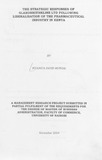| dc.description.abstract | GlaxoSmithKline PLC (GSK)is the second largest pharmaceutical company in the
world. It commands a share of 7.3% of the world's pharmaceuticals market. In
Kenya GSK has been operating since 1963 and it has grown into the largest
pharmaceutical firm in the country and East Africa today. Despite the
phenomenal growth locally, GSKhas been operating in an environment of
uncertainties and challenges ranging from an extended economic slump to
government litigation to increased competition among many others. Most of these
challenges started soon after liberalization of the industry in the late 80s and
early 90s. These challenges are discussed in detail in the study.
The main objective of this case study was to highlight the environmental
challenges multinational firms in general and GSK in particular have been
subjected to after: liberalisation in Kenya. GSKwas used as the unit of study and
the strategic responses revealed can serve as a benchmark for other firms
operating in this industry. The:study has outlined the previous as well as current
environmental challenges that the firm is facing and the measures it has
instituted to manage them.
In this study a number of GSK senior managers have been interviewed. Interviews
were carried out by way of an open ended questionnaire and captured on tape
recorder for subsequent analysis. All these people combined to give an accurate
,
VI
representation of events cutting right across the entire company for the period of
the study.
Interviews revealed that GSKhas faced challenges occasioned by the economic
slump of the 90s after certain market-based reforms were instituted as part of the
Structural Adjustment Programmes (SAPs)imposed by donors on the government
Some of these SAPs affected the markets in different ways resulting to fiscal
problems that cut across the Kenyan economy. Liberalisation also brought about
increased competition from other pharmaceutical importers. This was because the
market became more receptive to more cost effective medications causing the
existing multinationals to re think their competitive strategies.
In addition, the regulation policy by the Ministry of Health opened the door for all
manner of unfair competition occasioned by the sudden and consistent influx of
parallel imports, illegal imports and counterfeits. This problem persists to date.
An interesting challenge that .;manifested itself was increased demands by doctors
and patients. With the revolution of the i?formation highway i.e. airwaves and the
internet, customers have access to lots of information which they are now using t(
demand safe, cost effective and effective medications. Demands from doctors and
other medics for sponsorships to international scientific conferences have
increased. Professional organisations have also become more demanding. In this
regard GSK has set up systems that vet spcnsor'ship requests and a budget to
offset these costs.
Vll
Government legislation has also posed a challenge to business and especially wher
it was hijacked by lobby groups. Legislation relating to industrial property rights
has been enacted and many multinational branded manufacturers have had to
respond accordingly. Some responses have included lobbying with legislators and
even threatening litigation on governments that are intent on imposing these laws
Some of the responses detailed in the study have definitely contributed to
GSKKenya's overall performance as will be adduced herein. As such I
recommend that firms must set strategic priorities that ensure they meet
their long term objectives of adding shareholder value by exploiting local
opportunities, remaining relevant to local needs and conducting business
responsibly while adhering to laid out regulations. These principles will
guide firms across all industries to demonstrate responsible corporate
conduct across all aspects of their operations.
Further, a cross sectional study may be undertaken among firms in the
pharmaceutical industry in Kenya in order to compare their strategic
responses post liberalization. I also recommend a study on the impact of
parallel imports. illegal imports and/ or counterfeits on pharmaceutical
business in Kenya | en |

